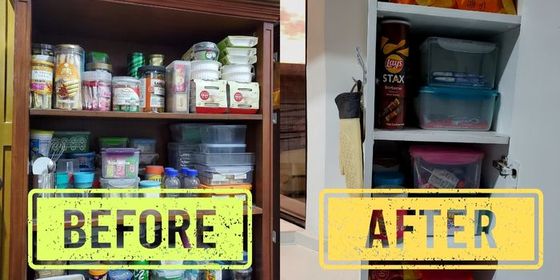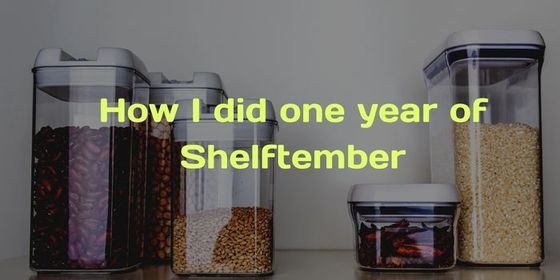A Year of Shelftember – Melany Heger
It has been a year and a month since I stumbled upon AussieDebtFreeGirl’s blog and Facebook posts about the Shelftember challenge. When you join this challenge, there are no hard rules—there’s some structure, but a lot is left to your creativity. So, I took it upon myself to do Shelftember for a year.
A year living off things in the pantry. “Wow”, you might remark, “you sure have a big pantry.” Yes, I do. I have a big pantry because I am (or was) a borderline hoarder. In fact, I’m going to tell you the story of how I overcame my problem by using the Shelftember challenge. Because of Shelftember, I was able to jumpstart a process of self-improvement.
A year ago, I was feeling lost and I did not have a method for clean-up. Fast-track to today: I sometimes still feel a little lost, but I’m getting a grip on it. I’ve also established some methods based on the Shelftember method. It’s inspired by frugal living and trusting your own logic versus marketing materials pushed under your nose.
It’s a method that works for me: Customized, pared-down, and realistic. It’s structured but it has wiggle room, because, well, we have kids.

What I Do
I stick to a menu plan, which I only change once a week.
I realized that if I don’t have some structure in place, I become too spontaneous. I’ll buy things on a whim, even if I am not going to use them up. As a result of my impulsiveness, I would pile things up—things that would not be used for weeks on end. Then the new things become old things, and it becomes a destructive cycle.
I write the menu plan after I’ve made an assessment of our needs. Not before.
Without assessing what I have, I’m just guessing. Sometimes intuition can be trusted, but sometimes it’s unreliable. If you are middle age like me, or there’s just too much going around with the kids, facts get forgotten. You got to measure objectively, and coldly. I look at my pantry and ask myself if I am eating down the pile. Then I write down the menu.
I ask my kids for help
I get the kids involved in menu planning, so we are all accountable for our actions. My kids are 14 and 9, and they want their opinions heard at these ages. There have been many times when I was saved from an unnecessary trip of so-called necessities because of their input. Kids are brilliantly creative, and at the same time, their food needs are simple, really. If they want Mac and Cheese again, I’ll let them have it.
What I Don’t Do
I don’t toss out things because of the expiry date
Many packaged foods are not really expired even if the label says so. I always use my own senses. There are authoritative sources to know about what foods to toss and what should be kept.I’m not ashamed of buying bargain items
I buy things that are half the price or less. But only when I am going to use them soon. Since this is part of the Shelftember scheme, I only buy fresh produce or dairy at discounts. All other packaged goods are disqualified! There are plenty of options to keep the veg and dairy past their expiry dates. I make use of my freezer. Because store brands are equally good, I buy fruits, veg, and dairy that are lower in price. One thing about these premium items is that they are placed front and center, so it’s easy for you to reach them. This is a wily marketing trick. If you’re in a hurry, you won’t even have time to think, you’ll just grab the one that’s most prominently displayed. I look for things below my eye level—there the cheaper items are. There the store brands are too. A year of Shelftember helped me tap my creativity, as well as my kids’ creativity. As a family, we’ve created memorable meals because of Shelftember. I think that as modern consumers, we got used to having too many options. As a result of that, we buy more than we need because of FOMO (fear of missing out). I did not want to miss out on the newest flavor or variant of this or that, and I ended up with too many things. I’ve learned my lesson, and although I want to feed my curiosity, I should do it gradually. Although I want to stock up on bargains, I can’t have it all. If I stock up too much, things will just go to waste. The key is moderation—plan ahead, but not too far ahead. (I have yet to figure out the specifics of how much to stock up.) When we are forced to make do with what we have, we discover new ways of doing old things and new purposes for old things. Lastly, I did what worked for me and my household. Do what works for you. If you need any suggestions, there are all sorts of tips by AussieDebtFreeGirl. You can build from there.I don’t buy premium items
Final Thoughts


Leave a Reply